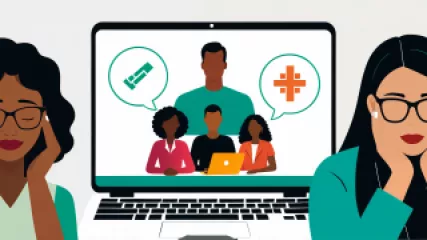Mastering Crisis Intervention: The Ultimate Guide to Professional Counseling Online
Introduction
In times of crisis, it is crucial to have access to immediate support and guidance. Whether you are an individual experiencing a personal crisis or a professional seeking to provide assistance, crisis intervention plays a vital role in helping people navigate through difficult situations. With the advent of technology, crisis intervention has expanded beyond traditional in-person counseling to include online therapy and counseling services.
This ultimate guide aims to provide a comprehensive overview of crisis intervention and how it can be effectively utilized through professional counseling online. We will explore the benefits of online therapy, the techniques employed in crisis intervention, and the importance of virtual mental health sessions. So, let's dive in and master crisis intervention in the digital age!
Understanding Crisis Intervention
Crisis intervention is a specialized approach that focuses on providing immediate support and stabilization to individuals who are in acute psychological distress. It aims to alleviate emotional pain, reduce the risk of harm, and help individuals regain a sense of control and well-being. Crisis intervention can address various crises, including but not limited to:
- Suicidal thoughts or attempts
- Domestic violence
- Substance abuse
- Grief and loss
- Mental health emergencies
Traditional crisis intervention typically involves face-to-face interactions between a mental health professional and the individual in crisis. However, with the advancements in technology, crisis intervention has evolved to include online therapy and counseling help, providing individuals with accessible and convenient support.
Benefits of Online Therapy
Online therapy has gained immense popularity in recent years for its numerous benefits. Here are some advantages of utilizing professional counseling online for crisis intervention:
- Accessibility: Online therapy eliminates geographical barriers, making it accessible to individuals who may not have easy access to in-person counseling services. It ensures that help is just a few clicks away.
- Convenience: Virtual mental health sessions allow individuals to receive therapeutic support from the comfort of their own homes, eliminating the need for travel and reducing scheduling conflicts.
- Privacy: Some individuals may feel more comfortable discussing sensitive and personal matters in the privacy of their own space. Online therapy provides a confidential and secure platform for open communication.
- Flexibility: Online therapy offers flexible appointment times, enabling individuals to seek help when they need it the most, even outside traditional office hours.
- Continuity of Care: In crisis situations, immediate intervention is crucial. Online therapy ensures continuity of care by providing timely support without delays caused by travel or availability.
These benefits make online therapy an effective and efficient mode of crisis intervention, especially in today's fast-paced and interconnected world.
Techniques Used in Crisis Intervention
Crisis intervention utilizes various techniques to support individuals in crisis and facilitate their emotional healing. Here are some commonly employed techniques:
- Active Listening: Active listening involves attentively hearing and understanding the individual's concerns, emotions, and experiences. It helps establish rapport and empathy, creating a safe space for the person to express themselves.
- Assessment: Conducting a thorough assessment is essential to identify the severity of the crisis, assess any potential risks, and determine the appropriate course of action.
- Safety Planning: Collaborating with the individual to develop a safety plan that outlines strategies to prevent harm and manage crisis situations effectively. This may involve identifying supportive resources, creating coping mechanisms, and establishing emergency contacts.
- Psychoeducation: Providing education and information about the crisis, common reactions, and available resources can help individuals gain insight into their situation and develop coping strategies.
- Emotional Regulation: Assisting individuals in managing their emotions by teaching relaxation techniques, grounding exercises, and effective coping skills. This empowers them to regain control over their emotional state.
- Referral and Follow-up: When necessary, crisis intervention professionals may refer individuals to additional support services or follow up with them to ensure ongoing care and recovery.
These techniques are tailored to meet the unique needs of each individual and provide them with the necessary tools to cope with crisis situations.
The Importance of Virtual Mental Health Sessions
Virtual mental health sessions have become increasingly important in crisis intervention. They offer a range of benefits that contribute to the overall well-being of individuals in crisis:
- Immediate Support: Virtual sessions provide immediate access to professional counseling online, ensuring that individuals receive the support they need promptly.
- Reduced Stigma: Some individuals may hesitate to seek in-person counseling due to the associated stigma. Online therapy reduces this barrier, allowing individuals to seek help without fear of judgment.
- Increased Reach: Online therapy expands the reach of crisis intervention services, making them accessible to individuals in remote areas or those with limited mobility.
- Enhanced Comfort: Being in a familiar environment during virtual sessions can help individuals feel more at ease and willing to open up about their feelings, leading to more effective counseling.
- Continued Support: Virtual mental health sessions enable ongoing support, ensuring that individuals receive consistent care throughout their recovery journey.
The availability and effectiveness of virtual mental health sessions make them an invaluable tool in crisis intervention, bridging the gap between individuals in distress and the professional help they need.
Conclusion
Crisis intervention plays a crucial role in supporting individuals during times of acute psychological distress. With the advancements in technology, crisis intervention has evolved to include professional counseling online, providing accessible and convenient support through virtual mental health sessions. By understanding the benefits of online therapy, the techniques utilized in crisis intervention, and the importance of virtual mental health sessions, we can effectively master crisis intervention in the digital age. Remember, when it comes to crisis intervention, seeking help is a sign of strength, and professional support is just a click away.






